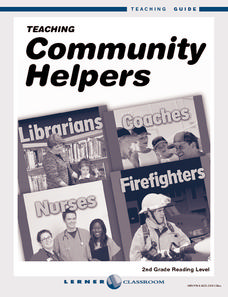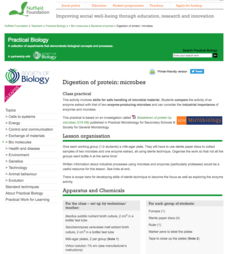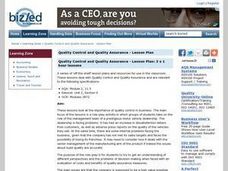Curated OER
Papier-Mâché Globe
Paper mache projects are great for using up paper from the recycle bin. Give your class the chance to create a three-dimensional globe out of paper mache. They'll work to make their globes as accurate as possible, adding proper colors...
PBS
The Elements
An attractive handout displays the periodic table of elements in full color. Each group has its own color, and each element is represented by its name, chemical symbol, atomic number, and atomic weight. What makes this periodic table...
Lerner Publishing
Living or Nonliving
It's alive! Or is it? Through a series of shared readings, whole class activities, and independent exercises children explore the difference between living and non-living things, creating a pair of printable books...
Lerner Publishing
Teaching Community Helpers
Youngsters discover who the leaders in their community are and what it means to build a community in this four-lesson unit.
Lerner Publishing
Teaching Habitats
What makes up a habitat? Use this resource to engage first graders in the exploration of desert, wetland, forest, and ocean habitats. Youngsters classify plants and animals into the four distinct habitats through drawings and cutting and...
Agriculture in the Classroom
A Rafter of Turkeys
How did that turkey get from the early Aztec culture to your table? Learn about the history of wild and domesticated turkeys in North America, as well as their inclusion in Thanksgiving traditions, with a two-part agricultural science...
Maine Math & Science Alliance
Earth as a System
Ecosystem, human body system, weather system. We hear the word system a lot, but what does it really mean? In the activity, pairs or groups of learners discuss how a bicycle is a system and then analyze objects in their classroom and...
University of Northern Iowa
Clothing
As part of an investigation of the folk traditions of their area, class members research the articles of clothing worn at earlier times, the fibers and materials, and the machinery used to produce these items. In addition, class...
National Institute of Open Schooling
p-Block Elements and Their Compounds – I
Lesson 21 in a series of 36 specifically focuses on elements and their compounds from groups 13, 14, and 15 on the periodic table — including boron, carbon, aluminum, silicon, nitrogen, and phosphorus. Classes learn how some of these...
Constitutional Rights Foundation
Unauthorized Immigration and the US Economy
As part of a study of immigration and the U.S. economy, class members assume the role of newspaper editors to determine which submitted letters to print on their paper's editorial page to present a balanced view of the debate.
National Institute of Open Schooling
General Characteristics of the p-Block Elements
The 20th installment in a series of 36 focuses on the characteristics of the p-block elements. Learners discuss, read about, and answer questions pertaining to the occurrence of these elements in nature, their electron configurations,...
Nuffield Foundation
Digestion of Protein: Microbes
Milk the resource for all it's worth. Young biologists perform assay techniques to test the digestion of protein. They place bacterial samples, fungal samples, trypsin solution, and distilled water on a milk-agar plate to see the effects...
National Nanotechnology Infrastructure Network
Silver and Bandages: Assessment of Inhibition of Bacteria by Silver Colloid-Impregnated Bandages
Silver: more than jewelry, it's also a natural antimicrobial agent. An inquiry-based lesson asks collaborative groups to design and implement an experiment to test this property. Using samples of silver nanoparticles and a strain of...
Montana State University
Climb into Action!
Climate change affects even the largest and intimidating of landforms—even Mount Everest! A resource helps teach learners the connection between global climate change and its effects on Earth. Activities include videos, class discussion,...
Syracuse University
American Industrial Revolution
While the Industrial Revolution may have fueled America's rise to the top of world markets, the child laborers often faced dangerous conditions. Using primary source images and other information, scholars consider what these children...
Curated OER
A Visual History: Industry, Society, and Social Mobility in Hartford
Eleventh graders examine the industrialization of Hartford. In this American History lesson, 11th graders analyze pictures in Hartford. Students participate in a gallery walk of artifacts.
Curated OER
Building Tetrahedral Kites
Students work together to build tetrahedral kites. They must follow directions and the provided materials. They discover the engineering concepts needed to make the kite.
Curated OER
Critical Path Analysis
Students examine the key requirements of critical path analysis, and analyze the purpose, benefits and limitations of using such a tool. In this business lesson, students apply the principles of critical path analysis to a business...
Curated OER
Materials: Hidden Costs, Mapping the Source and Cost of Raw Materials.
Young scholars map connections among raw materials. In this environmental stewardship lesson, students design strategies to minimize the use of raw materials and discuss how to use more sustainable materials.
Curated OER
Quality Control and Quality Assurance
Students examine the importance of quality in modern business. They identify the internal and external demands for quality. They work together in groups to role play given scenerios.
Curated OER
Water and Ice
Students experiment with water and ice. In this states of matter lesson, students explore how water can change from a solid to a liquid and back again. They discuss and write about the results of the experiment in a science journal.
Curated OER
The No Zone of Ozone
Pupils explore the causes and effects of the Earth's ozone holes through discussion and an interactive simulation. Using gumdrops and toothpicks, they conduct a large-group, interactive ozone depletion model.
Curated OER
Why Data
Students investigate and discuss why data is important. In this statistics instructional activity, students collect, graph and analyze data. They apply the concept of data and lines to finding the rate of change of the line created by...
Curated OER
If a tree falls in the forest.......
Students identify by-products from forests used in their everyday lives. They describe several ways in which people depend on forests. Students list everyday products made from trees, then research and categorize less common products...

























